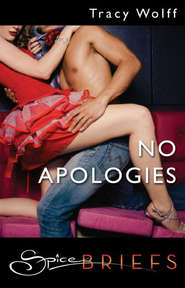По всем вопросам обращайтесь на: info@litportal.ru
(©) 2003-2024.
✖
About the Baby
Автор
Год написания книги
2018
Настройки чтения
Размер шрифта
Высота строк
Поля
“This is Africa.”
This time when she pulled against his arms, he let her go. It cost him, though. “I’m guessing that’s not a statement of pride?”
Her laugh cut like broken glass. “Not quite. Africa is…Africa. No matter what happens, no matter who tries to help or hurt, nothing really changes under the surface. One revolutionary group seizes control and another rises up to fight them. One drought ends and another natural disaster starts. One horrific virus goes dormant and another one takes its place. It’s a damn nightmare, one I’ve been caught in for ten years now.”
“I’m so sorry.” It was inadequate, but he had no idea what else he was supposed to say.
She didn’t answer, simply shrugged, shivered. Though he knew her trembling had more to do with her memories than it did the breeze in the night air, he slipped out of his jacket and draped it around her shoulders, anyway.
“Einstein defined insanity as doing the same thing over and over again but expecting a different result,” she finally continued. “I wonder what he would say about our policies in Africa. I wonder what he would say about me. I do the same tests, run the same research, teach the same classes. It doesn’t make a damn bit of difference. There will always be war, always be poverty. And there sure as hell will always be disease.”
She stood, walked over to the man-made pond at the center of the park. Looked out over the dark, rippling water for long seconds. Even as he wondered what it was she was seeing out there, she added, “On the plus side, I don’t have to worry about losing my job anytime soon. Unless, or course, I totally flip out.”
“Are you worried about that happening?”
“Sorry—did I make the doctor nervous?” She glanced at him. “I’m fine, Lucas. No nervous breakdowns or splits from reality in my future.”
Her voice dropped and he had to strain to hear as she muttered to herself, “No matter how much I wish there was.”
The aside was one more blaring signal of her disillusionment. It was painful to listen to, especially when he remembered the wide-eyed girl she’d once been, determined to make a difference and ready to take on the whole world to do it. Usually he could still find that idealistic girl under the pain and cynicism that came with ten years of public health work, but tonight she was MIA. All he could see when he looked at Kara now was the horror that came from taking on disaster after disaster—and losing, again and again and again.
Not that he blamed her for being tired or angry or heartsick. It had been years since he’d set foot in
Africa—he’d made the choice to put all his efforts and resources into his clinic instead—but that didn’t mean he didn’t remember the utter hopelessness and heartbreaking beauty of the people and the place. The two years he’d spent there, fresh out of medical school, had been the best and worst of his life. He’d often wondered how Kara held it together so well. Now he knew—she didn’t. She just looked like she did.
It was the last thing he wanted for her.
“I’m sorry, Kara,” he repeated, knowing even as he did that it was a useless sentiment.
She shook her head. “It is what it is.”
“What it is, sucks.”
“Yeah.” She started to shrug it off, but even in the dim light of the park, he could see when she decided not to. There was a change to her face, an opening of it that he hadn’t even realized was missing until he saw it happen. “It hurts. The children—” Her voice broke. “This time was bad, Lucas. It was really, really bad.”
“I know, baby.”
“You don’t know. You can’t know what it’s like.” She rubbed a hand over her face. “Because the sickness isn’t the worst part. I can deal with the death, deal with the pain of not being able to save everyone, as long as I have the chance to try. But lately, I haven’t even been allowed to try.”
“You’re right,” he said with a shake of his head. “I don’t understand.”
She laughed, a harsh, painful sound that hurt to listen to. “Yeah, neither do I. I mean, we’re a scientific organization, right? It’s our job to control disease—shit, it’s in our name and our mission statement, so why is it so hard to get people who aren’t doctors or scientists to understand?”
“What people?”
“Politicians. Accountants.” She shook her head. “I shouldn’t be back yet. There’s still way too much to do in Somalia. Education efforts are just beginning—the conditions at most of the refugee camps practically breed cholera and there’s nothing I can do about it.
“You know, when I started at the CDC, the team leaders had more control. They said when an epidemic was contained. They said when it was time to go home. Now, politicians tell us what to do. What to say, where to go, how long before we have to get out…
“I’m one of the best damn epidemiologists in the world and I know I haven’t found the roots of this outbreak. Just like I know that, while our efforts are making a difference in Somalia, I needed another six to eight weeks to really make sure the education was working, that the conditions were changing.
“A week ago, I was in the hardest hit area of Somalia, fighting that damn disease and convinced that I actually had a shot at beating it. But then my boss called and here I am. The government has decided that it doesn’t want us in Somalia right now, because of some political problem I don’t know about or even care about. I tried to explain that this had nothing to do with politics, that we were really getting a handle on things and just needed a little more time. It didn’t matter. I was on a plane headed home a few days later. While cholera is loosely contained in Somalia, it will make a comeback in less than three months. I guarantee it. And when it does, it will have spread beyond Somalia’s borders and be ten times harder to contain than if we had just been allowed to finish our jobs in the first place.
“I’m so sick of putting bandages on festering wounds instead of actually fixing the problem. I mean, I know politics are a necessary evil. But sometimes, human decency has to exist outside of them, right? Because if we can’t do our jobs, then these viruses are going to keep spreading and keep killing people, people who wouldn’t have to die if I could just finish what I started.”
She turned away from the pond and walked along its edge in her bare feet. “That’s what I can’t take. Not the deaths we couldn’t prevent, but the thousands of deaths we can prevent and are being told not to. I can’t help people, can’t do my job, if they won’t let me. And if I can’t help people, why am I doing this job? Why am I putting myself through the pain and the risk and the abysmal conditions if nothing I do is going to matter?”
She looked at him then and he realized she was waiting for an answer. Too damn bad he didn’t have a clue what to tell her. What she was talking about was one of the reasons he’d gotten out of the game, one of the reasons he ran his own clinic now. There was no one around to tell him he couldn’t treat people who couldn’t pay. No one to tell him he had to stop caring for a patient that needed his help.
“The CDC isn’t the only game in town, you know. You have other options.”
“That’s exactly what I’ve been thinking about. The thing is, I love my job. I’m really good at what I do.”
“Then they should let you do it.”
She smiled sadly. “Yeah.”
“When are you supposed to go back into the field?”
“Who knows? Two days, two months? Whenever the next epidemic hits.”
Everything inside him rebelled at her diving back in so soon. “You can’t do that,” he said. It was dangerous and she was obviously exhausted. “You need some downtime, a chance to get your perspective back. You need to rest for a while, decide what you want to do.”
“Oh, really?” She turned on him. “Is that what I need? To go on vacation and regain some perspective? And here I thought what I needed was to find a way to keep people from dying.”
“You’re not God, you know. There’s only so much you can do.”
“Which is why we’re having this conversation. I’m trying to decide if I can keep helping the way that I am, or if I need to walk away from the CDC and find another avenue where I can do my job. I suppose I could always track the flu for the Department of Public Health.”
While her statement had enough sarcasm to insure he understood her contempt for tracking the flu, he didn’t think it was that bad of an idea. At least until she got some distance from Africa and the CDC and could make a reasonable, logical decision. He didn’t say that, though, refusing to get drawn into an argument that neither of them would win. She didn’t say anything either and an awkward silence stretched long and taut between them, their easy camaraderie disappearing in the face of her hurt and anger.
He let her stew for a few minutes, and tried to compose an apology in his head, even though he hadn’t said anything wrong. Now was not the time to antagonize her, when she needed a sounding board and a friend.
But as he opened his mouth, she dove in first, blurting out, “I’m sorry, Lucas. There’s no reason for me to take my crappy mood out on you. I guess I should have stayed home and popped a sleeping pill instead of surprising you.”
“I’m glad you didn’t.” Even if his inability to do anything for her was killing him. He was a doctor, for God’s sake. Shouldn’t he be able to fix this? Fix her?
“You know what’s sad?” she said after a minute. “I think you mean that.”
“I do mean it.”
“I know. But just because you’re my best friend doesn’t mean you have to put up with all this maudlin shit.”
“It isn’t maudlin if it’s how you’re really feeling.”
“Sure it is—the two aren’t mutually exclusive, you know.”
She sat down on the grass, pulling her knees up to her chest and wrapping her arms around them. The innate defensiveness, the wariness, of the position struck him. Made him sad. So that when he sat down beside her, he made sure to give her plenty of personal space.











